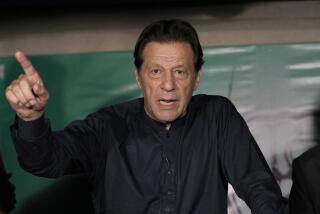Pakistan court bans Nawaz Sharif from elective office
- Share via
ISLAMABAD, PAKISTAN — Former Prime Minister Nawaz Sharif may well be the most popular politician in Pakistan. So the Supreme Court’s decision Wednesday banning him from holding elective office has set the stage for what could be a bitter showdown between his backers and the already shaky government of President Asif Ali Zardari.
Pakistan, which over the last 18 months has seen a grass-roots uprising against longtime military leader Pervez Musharraf, the assassination of former Prime Minister Benazir Bhutto and the advent of civilian rule, appears ill prepared for another prolonged period of political turmoil. Islamic insurgents are gaining strength, and the economy is virtually on life support from international lenders.
Analysts characterized Wednesday’s court ruling as a drawing of battle lines between Zardari’s Pakistan People’s Party and its onetime ally, Sharif’s Pakistan Muslim League-N. The two parties teamed up last February to take on Musharraf, soundly defeating his party in parliamentary elections and ousting him from office six months later. But having gained power, they fell out with each other.
Sharif’s supporters angrily protested Wednesday’s verdict, saying they do not recognize the legitimacy of the high court. They repeated demands for the reinstatement of the former chief justice and other senior judges dismissed by Musharraf in late 2007 during a bout of de facto martial law.
“This is a mockery of justice, a mockery of democracy,” Ahsan Iqbal, a senior leader of Sharif’s party, said of the ruling. “This decision has once again pushed Pakistan on the path of political confrontation and political instability.”
The former prime minister’s brother, Shahbaz Sharif, also was disqualified by the high court from holding office, in effect removing him from his position as chief minister of Punjab, the country’s most populous and affluent province.
Supporters of the Sharifs poured into the streets of major cities, chanting anti-government slogans. No serious violence was reported.
A firebrand populist, Nawaz Sharif returned to Pakistan in late 2007 after seven years in exile, foiling efforts by Musharraf to keep him away. Although Sharif’s party trailed the Pakistan People’s Party in last February’s vote, some commentators attributed that to sympathy over the assassination seven weeks earlier of Bhutto, Zardari’s wife. Most opinion polls suggest that Sharif’s popularity has now eclipsed Zardari’s.
In the Sharifs’ home base in the eastern city of Lahore, the former prime minister suggested that Zardari had orchestrated the court verdict against him.
“I want to tell the nation that it should stand up to this lawlessness, to this . . . unconstitutional judgment, to this villainous act by the president of the country, Zardari,” he said during a news conference.
The prospect of a resurgent Sharif, who has the loyalty of many religious conservatives, may make some officials in Washington nervous. Zardari’s government is considered much more Western-friendly, whereas Sharif, as prime minister in the 1990s, defied U.S. admonitions and presided over Pakistan’s first nuclear test.
However, the Obama administration has made an effort to build bridges with Sharif; the new U.S. special envoy, Richard Holbrooke, made a point of meeting him during a recent visit.
The rulings against the Sharif brothers upheld earlier court decisions against both of them. The ban on Nawaz Sharif holding office stemmed from criminal charges brought against him after he tried unsuccessfully to prevent Musharraf from overthrowing him in a coup a decade ago.
Even before Wednesday’s verdict, tensions had been growing between Sharif and Zardari over the government’s failure, after nearly a year in power, to reinstate the judges.
A lawyers movement that was instrumental in driving Musharraf from office had already vowed to hold massive street demonstrations next month demanding the restoration of the previous judiciary. Wednesday’s ruling was considered likely to galvanize public support for both the lawyers and Sharif, who has said he will join the protests.
“The political ramifications will be felt for many months to come,” said Zaffar Abbas, editor of the influential Dawn newspaper. “We may be looking for a very long, drawn-out battle between the government and the opposition forces led by Nawaz Sharif.”
Zain Shaikh, a constitutional expert, said the Sharif brothers had limited scope for any judicial review of the high court’s verdict. But some officials of Zardari’s party suggested that some kind of reconciliation with Sharif might still be possible. “We will have to see how to work together,” said Farzana Raja, a leader of the Pakistan People’s Party.
The renewed turmoil comes at a time when the government is confronting a burgeoning Islamic insurgency that has spread from the tribal lands along the Afghan frontier to other parts of Pakistan.
Zardari and other senior leaders appear conflicted over how to deal with the threat posed by militants. Although the government has expressed determination to do battle with insurgents, it recently entered into truces with the Taliban in two volatile areas, the Swat Valley northwest of Islamabad, the capital, and the Bajaur tribal region.
Those cease-fires have aroused concern among Western leaders who fear the militants in Pakistan will be able to carve out larger havens from which to attack North Atlantic Treaty Organization troops in Afghanistan.
--
More to Read
Sign up for Essential California
The most important California stories and recommendations in your inbox every morning.
You may occasionally receive promotional content from the Los Angeles Times.













